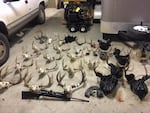
A file photo of deer heads and bull elk. In Oregon, officials are working with community members to crack down on poaching.
Washington Department of Fish and Wildlife
Three bull elk, one buck and one doe were illegally killed last month, all in the same week.
According to officials with the Oregon Department of Fish and Wildlife, poaching has always been a problem in the state, but now Oregonians are coming together to put an end to it.
In 2019 the Oregon Legislature passed a new anti-poaching measure. The measure assigned four additional Oregon State Police Wildlife Troopers and one additional sergeant, bringing the current total of troopers to 128. Oregon and Alaska are the only states that partner with state troopers rather than having agency game wardens.
The measure also added a roving prosecutor, available to prosecute cases that happen across county lines.
But with over 90,000 square miles of land, Oregon troopers patrolling for crimes against wildlife only discover a fraction of them.
The Oregon Hunters Association is offering up to $1,500 in reward money through the Turn In Poachers tip line for information that leads to citations or arrests in the elk and deer cases last month. The Oregon Department of Fish and Wildlife is offering hunters preference points, which help hunters draw licenses in hard-to-hunt spots, for community members who prefer that over a cash reward.
Yvonne Shaw, who coordinates ODFW’s Stop Poaching campaign, works to increase education and awareness of poaching among folks from all walks of life.
“From the hunters and anglers to kayakers and hikers, bikers and surfers or anyone who’s out enjoying our wild places,” she said. “We want them to be aware that crimes can be happening. We want to educate them on how to recognize and report those crimes.”
Shaw says its important folks be aware of their surroundings and call the tip line.
“It may be shots in the night, or a vehicle moving up and down a road slowly casting light out, or a vehicle parked in a haphazard way,” she said. “Or if you come across a carcass on the side of the road, it may look like an animal that was struck by a car, but that may not be what happened.”
According to Shaw, poaching happens all across the state and doesn’t just involve big game animals or fish. People illegally harvest raptors, turtles, clams, crab, shrimp, and other wildlife. Shaw says the numbers regulating legal harvests are in place for a reason, and when poachers violate these laws they harm not only wildlife but communities as well.
“Fish and wildlife resources belong to all Oregonians,” Shaw said, “and so poachers are taking these natural resources from all of us.”
